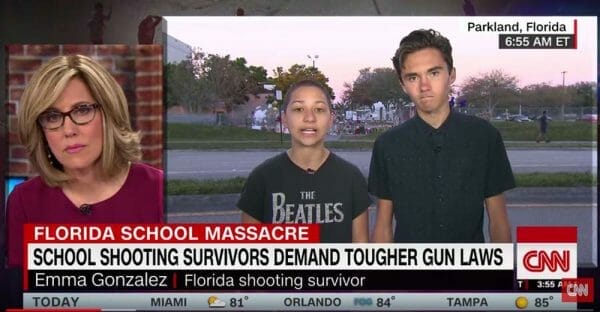Open Letter to Students of Marjory Stoneman Douglas High School

You have experienced a horror that no one should have to go through. And the claims that have been made that some among you are hoaxers or actors are a disgusting attempt to add further injury, a desperate effort to glom on to the notoriety of a killer.
I am glad to see you participate in the political process. As a teenager in the 1980s, I was one of the few among my peers who cared about how our country is run, and I do remember all the work that people your age have to do to get ready for adulthood. Things don’t get easier as the years add up, so I hope that you maintain your commitment to be involved.
That being said, there are some things that you need to know about the political sphere:
It’s a Rough Business
No one who opposes you will care about your feelings. That’s not because the opposition is filled with jerks. It’s just the way politics works. The people on your side will exploit your feelings for the benefit of the political goal. In other words, unless the person talking to you is a relative or friend—and not even then, always—understand that your emotional states are commodities.
Disagreement is a Part of the Process
You may have noticed on social media that anyone who disagrees with someone else is likely to be called a troll. This is a stock accusation, and it’s worth exactly as much as the evidence provided to support the claim. A troll seeks to derail rational discourse. But disagreeing with your position isn’t trolling. It’s continuing the discussion. Ideas have to be tested to find their worth, and you’ll need to submit the proposals you are advocating for to the analysis of others.
Similarly, disagreeing with you doesn’t make a person identical to the ones who are calling you fakes. As I said above, you experienced a horror. I acknowledge that, but I disagree with what you want to do.
Gun Control Doesn’t Work
This claim may surprise you, but it’s at the heart of why I oppose what you’re trying to do. Take a look at one nation that is cited over and over as proof that we should impose strict gun laws: England. (Don’t quibble about England, Britain, and the United Kingdom. The data available are for England.) The homicide rate in that country has been basically flat since the late 1700s, hovering between one and two murders per hundred thousand residents. And yet, gun control didn’t become onerous until the second half of the twentieth century. Until then, the people of England could own and even carry firearms in a manner much like what we are able to do here in most of the United States.
But what about Australia? That nation imposed bans and restrictions in 1997, following the mass shooting in Port Arthur. But the homicide rate peaked in the late 80s at around two per hundred thousand, then began a decline that lasted until the middle of the last decade. The 1997 laws added no additional decline in the rate.
At this point, someone will declare that Australia hasn’t had a mass shooting since 1997. That may be true, though mass killings have taken place since then, it’s worth noting that New Zealand didn’t impose new gun laws in 1997 and also hasn’t had a mass shooting since. A mass shooting is a horror, but so is any murder, and since the gun laws are not reducing the overall homicide rate, is it really such a gain to say that those deaths are now only happening one at a time?
Here among the states of this nation, gun control also fails to show any effect on homicides. The Giffords Law Center to Prevent Gun Violence publishes a scorecard of gun laws in each state. The more burdens imposed on gun rights, the higher the score. And yet, comparing their ratings with the homicide rates by state shows no correlation. Some states with loose gun laws have lots of murders, while others have few. Some states with strict gun laws also have lots of murders, while others also have few.
Which is to say, it’s not the gun laws. Bans and restrictions only burden the law-abiding. We can work together on things that do reduce violence—education, poverty reduction, and anti-bullying programs—but we can’t cooperate as long as demands to violate our rights are still on the table.
If you wish to discuss any of this, feel free to let me know. I am on Twitter @gregcampnc.
About Greg Camp

Greg Camp has taught English composition and literature since 1998 and is the author of six books, including a western, The Willing Spirit, and Each One, Teach One, with Ranjit Singh on gun politics in America. His books can be found on Amazon. He tweets @gregcampnc.

No comments:
Post a Comment